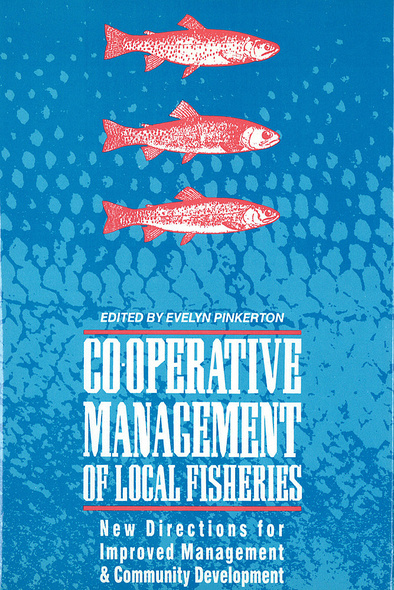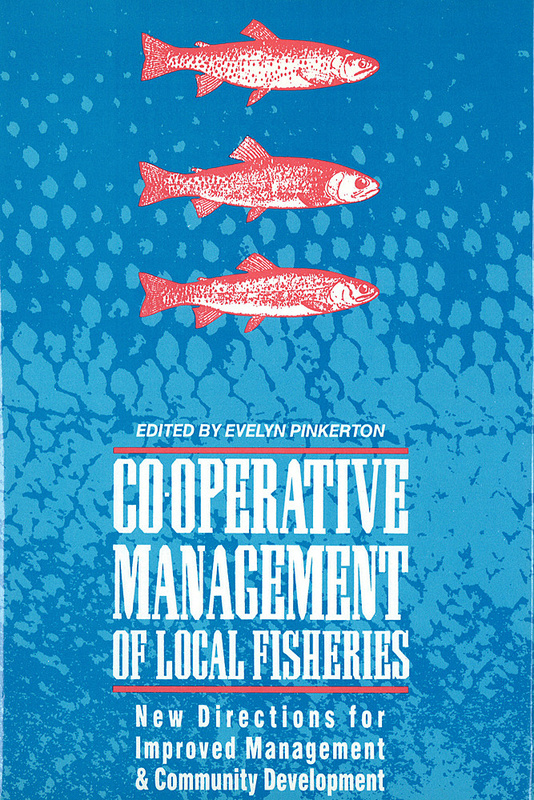Co-operative Management of Local Fisheries
New Directions for Improved Management and Community Development
In recent years concern over the mismanagement and depletion of ournatural resources has grown. Innovative responses to this trend havebeen developed in the management of fisheries when groups orcommunities of fishermen and various levels of government in Canada andthe United States have worked out agreements to sharedecision-making.
This book is the first to consolidate information on the differentroutes by which these co-operative management arrangements haveevolved. The authors include anthropologists, environmental planners,biologists, economists, fishery managers and tribal and governmentalleaders. Their contributions examine the process of achievingco-management, the institutions created by co-management arrangements,and the benefits which result. Some of these benefits include moreefficient and equitable management, less conflict between governmentand fishermen, and better co-operation between groups of fishermen.
As the cost of centralized government rises and asresource-dependent regions demand greater control over development, co-operative management will become one of the most important means ofregulating the use of certain natural resources.
Co-operative Management of Local Fisheries looks atsuccesses and failures of these arrangements for shared decision-makingand offers guidelines for viable co-operative management.
I was very much impressed by Co-operative Management of Local Fisheries. It is a timely contribution to an increasingly important subject. While co-operative management cannot solve all or even most of the troublesome problems fishery managers encounter, it offers many opportunities for real contributions. This volume offers an excellent mix of analytical and case study material, presented by experts with a wide range of training and experience. Must reading for fishery managers.
The first genuinely scholarly attempt in anthropology to conceptualize/model co-management from the basis of empirical studies. It is important that the material get into the public domain for these management systems are blossoming in many resource fields. I suspect that joint management/planning/policy analysis will in the future draw heavily on this work.
Widely scattered fisheries on stocks of common property have long posed problems for 'developers.' Centralized bureaucracies have not often been successful in technocratic efforts to resolve the problems. Full privatization of ownership is generally impossible for ecological and social reasons. 'Co-management' seeks to transcend such inappropriate efforts, in part by building on both old and new traditions. This book's case studies offer much-needed insight on participatory human management as a way towards satisfactory fishing management.
Preface
1. Introduction. Attaining Better Fisheries Management ThroughCo-Management: Prospects and Problems / Evelyn Pinkerton
Part One: Indian-State Co-Management in the U.S. PacificNorthwest
2. Treaty Indian Tribes and Washington State: An Overview of theEvolution of Tribal Involvement / Fay Cohen
3. Getting to Co-Management: Social Learning in the Redesign ofFisheries Management / Norman Dale
4. Negotiating Salmon Management on the Klamath River / DannyJordan
Part Two: Non-indigenous Commercial Fishermen CreatingRegional and Local Co-Management
5. Co-Management or Co-optation: The Ambiguities of Lobster FisheryManagement in Southwest Nova Scotia / John F. Kearney
6. Co-Management of a Clam Revitalization Project: The New Jersey"Spawner Sanctuary" Program / Bonnie J. McCay
7. Alaska's Regional Aquaculture Associations Co-Management ofSalmon in Southern Southeast Alaska / Donald F. Amend
Part Three: Creative Institutional Response: EvolvingAboriginal Management Regimes Under New State Regulation
8. The Alaska Eskimo Whaling Commission: Successful Co-Managementunder Extreme Conditions / Milton M.R. Freeman
9. Prospects for Co-Management of Marine Animals in Alaska /Steve J. Langdon
10. The Development of State/Tribal Co-Management of WisconsinFisheries / Thomas R. Busiahn
Part Four: Provisions in Comprehensive Claims for NativeSelf-Management
11. Co-Management and the James Bay Agreement / FikretBerkes
12. Co-Management Provisions of the Inuvialuit Final Agreement /Nancy C. Doubleday
Part Five: B.C. Native Fishermen: Tradition andInnovation
13. The Struggle to Integrate Traditional Indian Systems and StateManagement in the Salmon Fisheries of the Skeena River, BritishColumbia / Mike Morrell
14. The Fisheries Co-Management Initiative in Haida Gwaii /Miles Richardson and Bill Green
15. Strategies and Possibilities for Indian Leadership inCo-Management Initiatives in British Columbia / J.R.MacLeod
16. The Future of Fisheries Co-Masnagement: A Multi-DisciplinaryAssessment / R. Bruce Rettig, Fikret Berkes, and EvelynPinkerton
Contributors
Index





